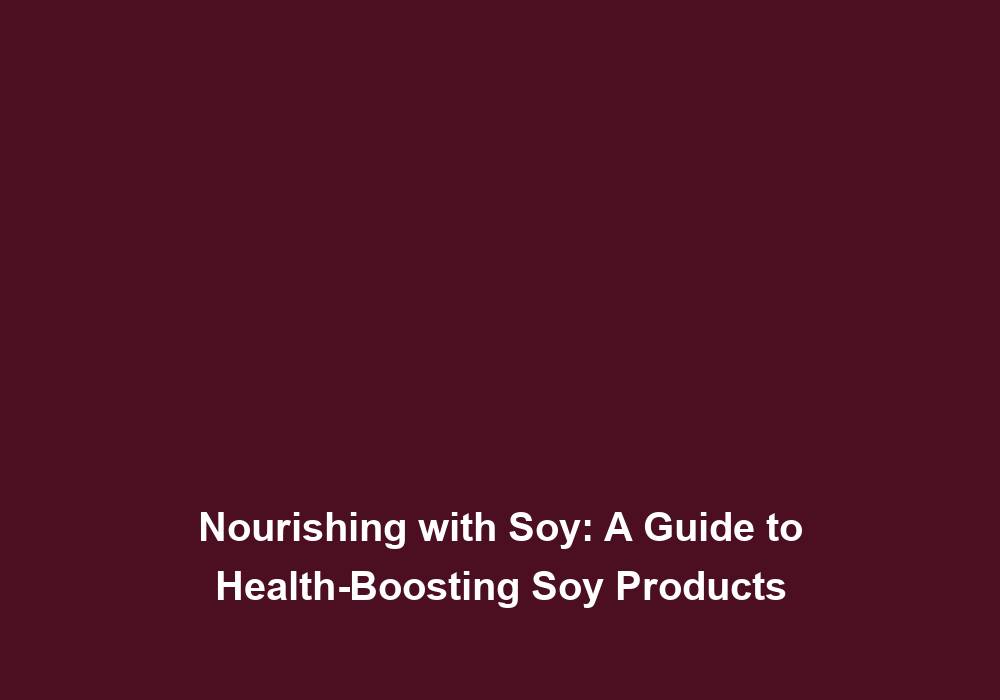Nourishing with Soy: A Guide to Health-Boosting Soy Products
Soy products have gained immense popularity in recent years due to their numerous health benefits. From soy milk to tofu, these versatile products offer a wide range of options for incorporating soy into your diet. Whether you follow a vegetarian, vegan, or simply health-conscious lifestyle, soy can be a valuable addition to your meals. In this guide, we will explore the various health-boosting soy products that can nourish your body and enhance your overall well-being.
Soy Milk: A Nutritious Alternative to Dairy
Soy milk is a popular plant-based alternative to traditional dairy milk. Made from soybeans, it is an excellent source of protein, calcium, and essential vitamins. Soy milk is also low in saturated fat and cholesterol, making it a heart-healthy choice. It is often fortified with additional nutrients like vitamin D and B12, making it a suitable option for those following a vegan or vegetarian diet.
Benefits of Soy Milk:
- Rich in high-quality protein essential for muscle growth and repair. Protein is crucial for maintaining and repairing tissues, and soy milk provides a complete protein source that contains all the essential amino acids needed by the body.
- Contains isoflavones, which act as phytoestrogens and may help alleviate symptoms of menopause. Isoflavones are plant compounds that have a similar structure to estrogen and may help reduce hot flashes, night sweats, and other menopausal symptoms.
- May help lower blood cholesterol levels and reduce the risk of heart disease. The soluble fiber in soy milk, called beta-glucan, can help lower cholesterol levels by reducing the absorption of cholesterol in the gut.
- Provides essential vitamins and minerals like calcium, vitamin D, and B12. Calcium is essential for strong bones and teeth, while vitamin D and B12 are crucial for overall health and well-being.
- Suitable for individuals with lactose intolerance or milk allergies. Soy milk is naturally lactose-free and does not contain the proteins that may cause allergies in some individuals.
Incorporating soy milk into your diet can be as simple as using it as a dairy milk substitute in your morning cereal or coffee. You can also use it in smoothies, baked goods, or as a base for creamy sauces and soups.
Tofu: A Versatile Plant-Based Protein
Tofu, also known as bean curd, is a popular soy product that has been used in Asian cuisine for centuries. It is made by coagulating soy milk and pressing the resulting curds into blocks. Tofu is an excellent source of plant-based protein and contains all nine essential amino acids required by the body.
Benefits of Tofu:
- High in protein and low in saturated fat, making it a healthy alternative to meat. Tofu is a great option for individuals looking to reduce their meat consumption or follow a vegetarian or vegan diet. It provides a good amount of protein without the high levels of saturated fat found in meat.
- Contains isoflavones, antioxidants that may help reduce the risk of certain cancers. These antioxidants have been studied for their potential anti-cancer properties, particularly in reducing the risk of breast and prostate cancers.
- Rich in minerals like calcium, iron, and magnesium, promoting bone health. Calcium is essential for maintaining strong bones and teeth, while iron is crucial for oxygen transport in the body. Magnesium plays a role in nerve function, blood sugar regulation, and blood pressure management.
- Versatile and can be used in various recipes, such as stir-fries, salads, and desserts. Tofu can be marinated, grilled, stir-fried, or even blended into smoothies and desserts. Its mild flavor and ability to absorb flavors make it a versatile ingredient in both savory and sweet dishes.
- Absorbs flavors well, making it a great addition to marinades and sauces. Tofu acts like a sponge and readily absorbs the flavors of the ingredients it is cooked with. This makes it a perfect canvas for marinades, sauces, and spices, allowing you to create a wide variety of flavorful dishes.
Incorporating tofu into your meals can be as simple as adding it to stir-fries, salads, or soups. You can also use it as a meat substitute in dishes like tacos, burgers, and stir-fried noodles.
Tempeh: A Fermented Soy Superfood
Tempeh is a traditional Indonesian soy product made from fermented soybeans. It has a nutty flavor and a firm texture, making it a popular meat substitute in vegetarian and vegan diets. The fermentation process enhances its digestibility and nutrient absorption, making tempeh a highly nutritious option.
Benefits of Tempeh:
- Contains probiotics, beneficial bacteria that support gut health and improve digestion. The fermentation process involved in making tempeh produces probiotics that can help maintain a healthy balance of gut bacteria and promote better digestion and nutrient absorption.
- High in protein, providing all essential amino acids needed for muscle growth and repair. Tempeh is a complete protein source, which means it contains all the essential amino acids required by the body. This makes it an excellent choice for individuals looking to meet their protein needs without consuming meat.
- Rich in vitamins and minerals, including vitamin B12, which is often lacking in plant-based diets. Tempeh is a good source of various vitamins and minerals, including vitamin B12, which is typically found in animal products. This makes it a valuable addition to plant-based diets that may be deficient in this essential nutrient.
- Contains prebiotics, fibers that promote the growth of healthy gut bacteria. In addition to probiotics, tempeh also contains prebiotics, which are fibers that act as food for the beneficial bacteria in the gut. These fibers help support a healthy gut microbiome and contribute to overall digestive health.
- May help lower cholesterol levels and reduce the risk of cardiovascular disease. Studies have shown that consuming tempeh as part of a balanced diet may help lower levels of LDL cholesterol, also known as “bad” cholesterol. High levels of LDL cholesterol are a risk factor for heart disease.
Tempeh can be sliced, marinated, and grilled, or crumbled and used as a ground meat substitute in dishes like chili, tacos, and burgers. It can also be steamed, sautéed, or stir-fried and added to salads, stir-fries, or grain bowls.
Edamame: A Nutrient-Packed Snack
Edamame, young soybeans, are often served as a tasty and nutritious snack. They are typically boiled or steamed and can be enjoyed on their own or added to salads, soups, or stir-fries. Edamame is a great source of plant-based protein, fiber, and various essential nutrients.
Benefits of Edamame:
- High in complete protein, making it an excellent choice for vegetarians and vegans. Like other soy products, edamame provides a complete protein source, containing all the essential amino acids needed by the body. This makes it a valuable protein option for individuals following plant-based diets.
- Rich in fiber, promoting healthy digestion and aiding weight management. Edamame is a good source of dietary fiber, which helps promote regular bowel movements and prevent constipation. Fiber also helps you feel fuller for longer, which can aid in weight management.
- Contains antioxidants, such as isoflavones and vitamin E, which protect against cell damage. Edamame is rich in antioxidants that help protect the body’s cells from damage caused by harmful free radicals. These antioxidants, including isoflavones and vitamin E, have been linked to a reduced risk of chronic diseases, such as heart disease and certain cancers.
- Provides essential minerals like iron, magnesium, and calcium. Edamame is a good source of minerals like iron, which is important for oxygen transport in the body, magnesium, which plays a role in nerve function and blood pressure regulation, and calcium, which is crucial for bone health.
- Low in calories and fat, making it a satisfying and guilt-free snack. Edamame is a nutritious snack option that is low in calories and fat. It provides a satisfying crunch and can be enjoyed as a healthy alternative to processed snacks like chips or cookies.
To enjoy edamame, simply boil or steam the pods until tender and lightly salt them. You can eat them by squeezing the beans out of the pods directly into your mouth or remove the beans from the pods and add them to salads, soups, stir-fries, or grain bowls.
Soy-Based Yogurt: A Dairy-Free Probiotic Option
Soy-based yogurt has become increasingly popular as a dairy-free alternative to traditional yogurt. Made from soy milk and fermented with probiotics, it offers a creamy texture and a tangy taste. Soy-based yogurt provides the benefits of probiotics without the lactose or animal ingredients.
Benefits of Soy-Based Yogurt:
- Contains live probiotics that support gut health and boost the immune system. Just like dairy-based yogurt, soy-based yogurt is fermented with live probiotic cultures that help maintain a healthy balance of gut bacteria. These probiotics support digestive health and boost the immune system.
- High in protein, providing essential amino acids for muscle repair and growth. Soy-based yogurt is a good source of plant-based protein, which is essential for muscle repair and growth. It contains all the essential amino acids needed by the body.
- Rich in vitamins and minerals, including calcium and vitamin D. Many soy-based yogurts are fortified with calcium and vitamin D, which are important for bone health and overall well-being. These nutrients are especially important for individuals following a dairy-free or vegan diet.
- Suitable for those with lactose intolerance or dairy allergies. Soy-based yogurt is naturally lactose-free and does not contain the proteins that may cause allergies in some individuals. It provides a delicious and creamy alternative to traditional yogurt for those with lactose intolerance or dairy allergies.
- Offers a delicious and creamy alternative to traditional yogurt. Soy-based yogurt has a creamy texture and a tangy taste similar to traditional yogurt. It can be enjoyed on its own, mixed with fruits and granola, or used as a substitute for traditional yogurt in recipes.
Incorporating soy-based yogurt into your diet is as simple as enjoying it as a snack, adding it to smoothies, or using it as a topping for desserts and breakfast bowls.
Incorporate Soy into Your Diet for Optimal Health
Soy products are a fantastic addition to any diet, providing an array of health benefits and a versatile range of flavors and textures. Incorporating soy milk, tofu, tempeh, edamame, and soy-based yogurt into your meals can help you meet your nutritional needs while enjoying a delicious and well-rounded diet. Whether you follow a vegetarian, vegan, or simply health-conscious lifestyle, soy products can be an excellent choice for nourishing your body and enhancing your overall well-being.







